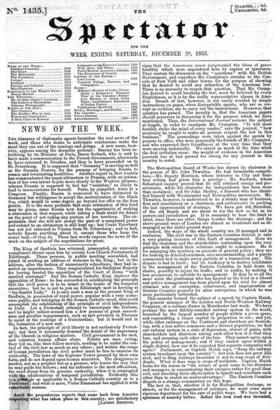The King of Sardinia has returned, unaccepted, an unseemly compliment
thrust upon him by certain Low Church Protestants of Edinburgh. Those persons, in public meeting assembled, had joined in sending an address of welcome to the King ; but in the address, after the fashion of unmannerly schoolboys, they had in- serted an impertinence. They congratulated his Sardinian Majesty for having treated the opposition of the Court of Rome "with merited contempt." But the Roman Catholic King deplores the opposition of Rome : he has succeeded in establishing the principle that the civil power is to be intact in the hands of the temporal executive ; but he is not to join an Edinburgh mob in hooting at "the Scarlet Lady." It is only such a man as the present King of Sardinia, in possession of royal power, popular with a very nume- rous public, and belonging to the Roman Catholic creed, that could accomplish the establishing of the principle of civil independence in Italy. Let a Protestant attempt to emancipate the Italians, and he might collect around him a few persons of great earnest- ness and peculiar temperament, such as met privately in Florence to assist at the readings of a Guitioiardini; but it mould end in the formation of a new sect.
In fact, the principle of civil liberty is not exclusively Protest- ant, nor does it necessarily demand the denial of the supremacy of the Church in religious matters. Civil government is for men, and concerns human affairs alone. Priests are men, erring, they tell us, like their fellow mortals, needing to be under the con- trol of the civil law as much as any others ; and within the range of human jurisdiction the civil power must be free to exercise its authority. The laws of the Supreme Power proceed by their own force, and do not depend upon human ministers. The clergyman is needed, not as a prophet but as a pioneer, who learns the way that he may guide his fellows ; and his influence is the most efficacious, the most direct from its genuine authority, when it is unmingled with the adulterations of temporal jurisdiction. Evidently this is a principle as applicable to a Roman Catholic country as to a Protestant ; and what is more, Victor Emmanuel has applied it with reraarkable success.


























